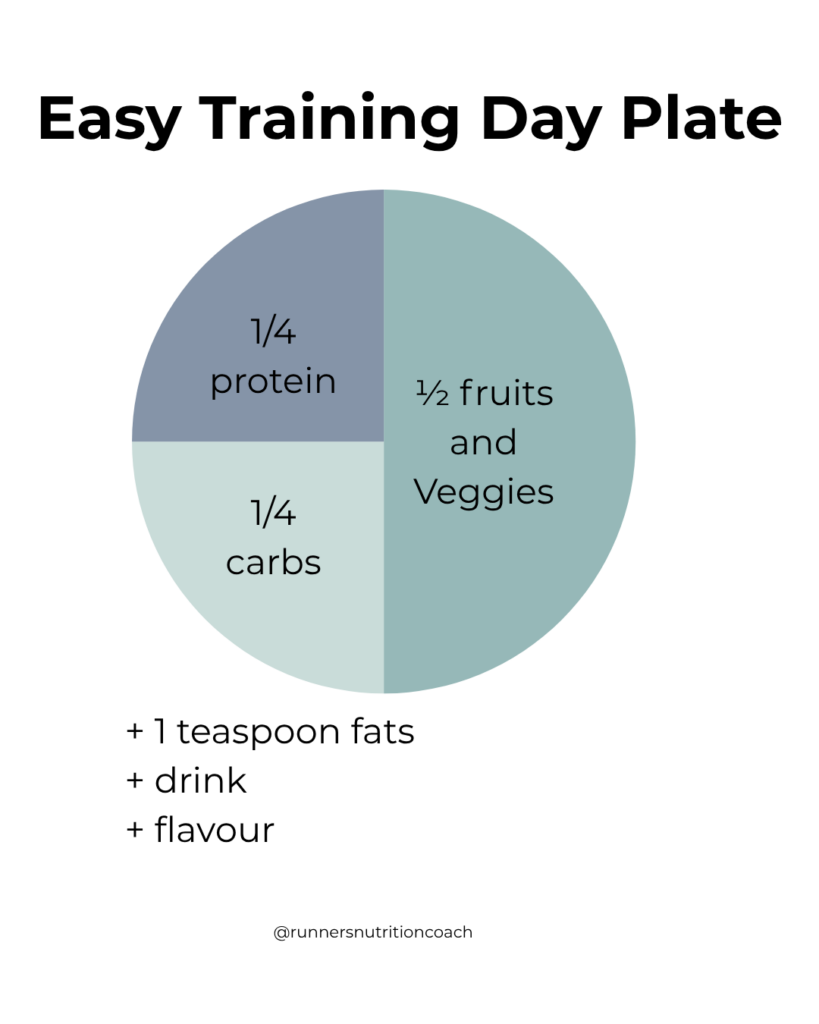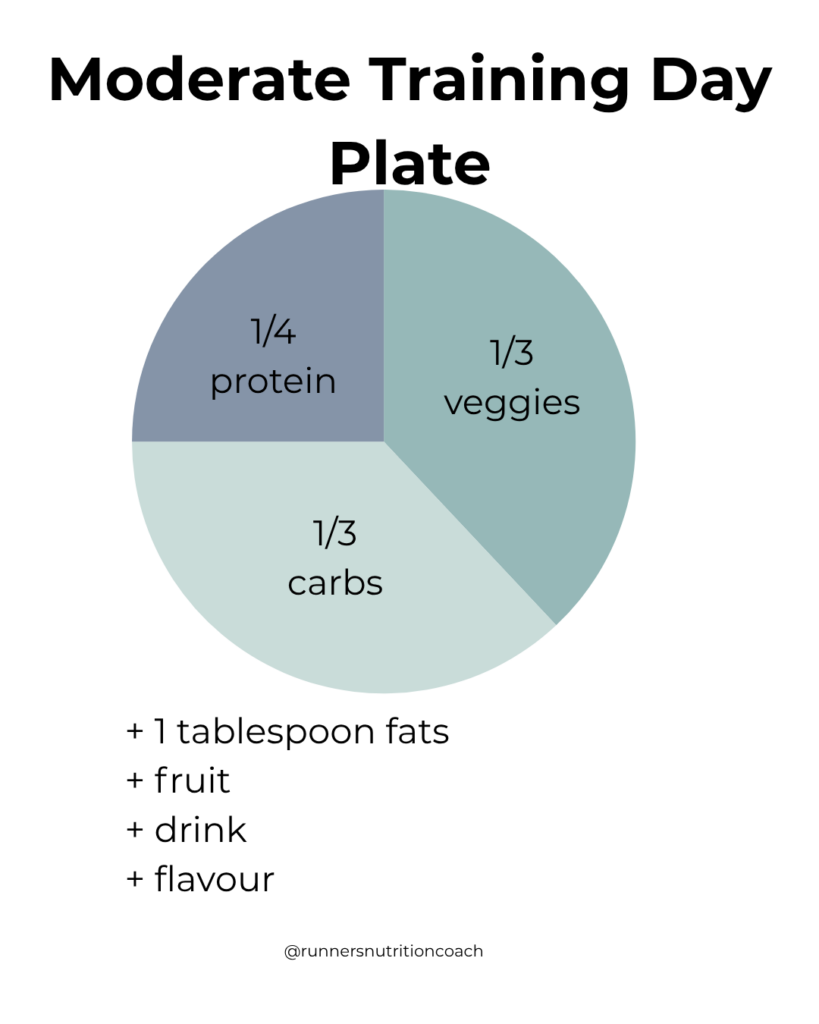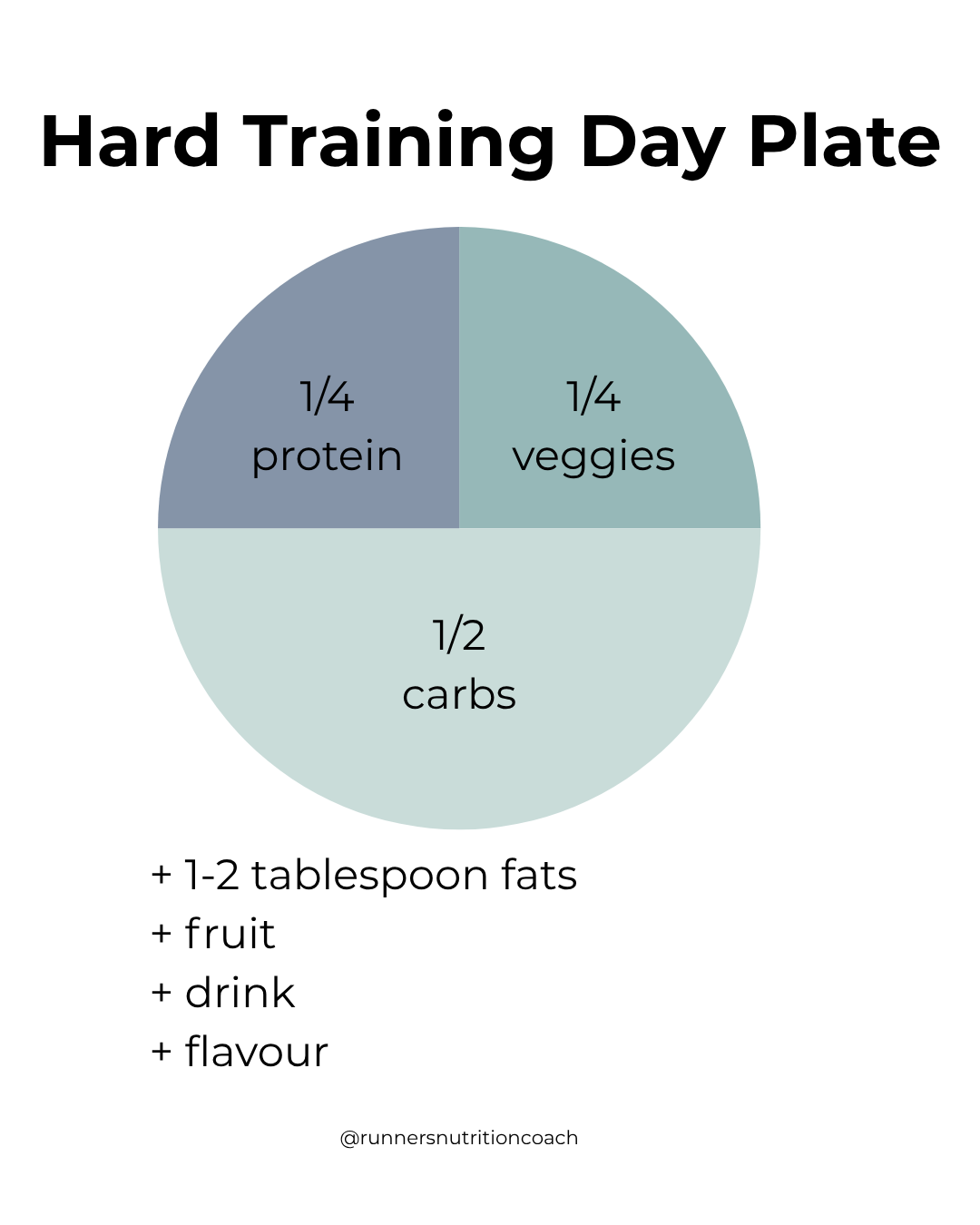Knowing what to eat and how to fuel your body during marathon training can be so difficult. There is so much information out there, eat carbs, don’t eat carbs, you need x amount of protein, you can fuel with just fat balls. And let’s not forget the conflicting messages around weight and body composition, with people saying they gained 10 lbs during marathon training and others saying running a marathon is great for weight loss. All the noise out there can be so overwhelming, so let’s get into it. What do you really need to be eating during marathon training so that you arrive at race day energised and ready to absolutely smash your goal. I’m here to break it down and smash the myths so you can build a marathon training diet plan that works for you.
The Foundations of a marathon training diet plan: Why nutrition matters
Building your marathon diet plan is more than just simply calories in vs calories out (genuinely hate this unhelpful term when people use it to say what you should be doing). The quality and nutrient make-up of our diet, especially when undertaking something as demanding on your body as a marathon, is essential. The foundations of a good marathon training diet plan are really the same as any good diet plan. You need your carbs, fats, proteins and micronutrients (think fruits and veggies). But what do these do:
Carbohydrates: Your body’s preferred energy source. Essential for intensity.
Fats: Provide energy. Important for micronutrient absorption.
Protein: The building blocks for muscle repair. Crucial for endurance runners.
Micronutrients: Vitamins and minerals. Think fruits and veggies. Key for gut health and overall well-being.
That is the basis of what makes up our diet, but what really matters when training for a marathon is the ratio of these foods on our plate. Too few carbs and you’ll hit the wall, not enough protein and it will hamper your recovery.
Building Your Marathon Training Diet Plan: Core Principles & The Athlete’s Plate
Now you know the foundations of a marathon training diet plan, it’s time to put that together into the quantities of what you need on different days of your training plan. Protein is consistent throughout, for this you want to be aiming for between 1.2-2 g/per kg of body weight. For a 70kg individual, this is in the range of 84-140 g of protein per day. The UK recommendation for fat intake is no more than 35% of your daily calories coming from fat, and for athletes, this shouldn’t drop below 20%. So if you were eating 3000 calories a day, then your fat intake would equate to around 66-117g of fat per day. Carbohydrates are where the biggest difference comes in when it comes to training. Here is a rough guide to what you want to be aiming for on any given day:
| Activity Level | Recommended Carbohydrate Intake |
| Very light/Rest Day | 3-5 g/kg BW daily |
| Moderate | 5-7 g/kg BW daily |
| High intensity | 6-10 g/kg BW daily |
| Very high | 8-12 g/kg BW daily |
I know what you are thinking, ‘that’s great and all, but I really don’t want to be counting everything’. Don’t worry, I’ve got you there. The athlete’s plate is a way for you to put this altogether visually, so you can build a plate with ease.
The Athlete’s Plate
The Athletes Plate is a visual guide to help athletes of all abilities visualise what their plate should look like on any given training day. It’s great for those who want to make sure they are getting the right make-up of nutrients to support training without the need to count calories or macros. There are 3 plates to cover: easy/rest days, moderate training days and then hard training days. The general guidance is to start with the moderate plate and then adjust up and down from there depending on your training schedule.
Easy/Rest Days

This plate is aimed at days when you are either on a complete rest day from exercise or are just doing some light, easy training. This would be anything under 1 hour at an easy pace, so it may include some easy runs or activities such as yoga and stretching. On these days, you want to aim for:
- ¼ of your plate to be protein
- ¼ to be carbohydrates (think whole grains where possible)
- ½ to be fruits and veggies.
You should also add 1 teaspoon of fats and then a drink, plus flavourings. The food doesn’t need to be boring, so add herbs and spices to suit your personal preferences.
Moderate Training Days
Moderate training days will make up the bulk of your training, and the plate you will focus on the most. This is the starting point from where adjustments can be made. On moderate days, you want:
- 1/4 protein
- 1/3 carbohydrates
- 1/3 vegetables
You also want to have a serving of fruits, 1 tablespoon of fats and then add a drink and flavourings as you would with easy day plate.

Hard Training Days

This is the plate you are likely to use for those long runs, especially once they hit 2+ hours. It is also the plate you would use for the days prior to races, where you want to increase your carb intake. On these days, you want to be eating:
- 1/4 protein
- 1/4 vegetables
- 1/2 carbohydrates
Plus fruit and 1-2 tablespoons fats, along with drinks and flavours as with the other plates.
Beyond the Guide
Before A Run
Making sure your body is fuelled before you head out the door is going to help you feel strong and energised while on your run. Before running, you want to aim to have a meal that contains 1-4 g carbohydrates and 15-25g protein. If your stomach is sensitive to GI issues while running, you want to limit fat and fibre intake before running, as these can be triggers for GI issues.
During you run
The general recommendation is if your activity is lasting between 1-3 hours, then take on 30-60g carbohydrates per hour. If you are going for over 3 hours, then aim for somewhere between 60-90g of carbohydrates. Start fuelling early, usually about 30-40 minutes into your run. The carbohydrates take a little while to get into your bloodstream, where they can be used. Leaving it too long results in hitting the dreaded wall.
Post Run
After your run, you want to be aiming to refuel as soon as possible, but ideally within 60 minutes. Aiming for 1-1.2g/kg BW of carbohydrates in that first hour to help boost recovery. For protein, aim for 15-25g again. Here’s where you can also add back in that fat and fibre if you reduced it before your run.
For more about what to eat before, during and after your run, along with some great meal options, download my FREE Ultimate Fuelling Guide for Runners.
Hydration
Ensuring proper hydration is key for not only optimal health but also endurance. During the day, drinking to thirst and being aware of the colour of your urine can help guide hydration levels. During exercise, the estimated losses from sweat range from 500 mL to 1.5 litres per hour. Weighing yourself before and after exercise, taking into account fluid consumption and urine output, can help guide how much to drink. You also want to consider sodium intake as this helps maintain fluid balance.
The Weight Management Conundrum: Losing or Maintaining Weight While Marathon Training
I know that weight can be a sensitive topic for some people, so feel free to skip this section if it is triggering or unhelpful to you. But if you have questions on weight management during marathon training, then here are some of the facts.
Can you lose weight during marathon training?
There is no reason why you can’t lose weight during marathon training, assuming you are in a calorie deficit, then weight loss is possible. However, there are some things to consider if this is something you are considering. First, a warning about weight loss while marathon training. Training for a marathon puts your body under a lot of stress, and it needs fuel and adequate nutrition to cope with this. As such, if you are in a calorie deficit, then you are not giving your body all the fuel it needs.
Why does this matter?
Because you are intentionally underfueling your body while marathon training, it can lead to an increased risk of injury and illness. Neither of these things are ideal when you are spending 12-16 weeks training for an event. An injury could end your marathon before you make it to the start line.
If you are seeking to set a personal best, then losing weight while marathon training may not be the best course of action. Personal bests are made in training; you need to be training hard and making those gains to see the results come race day.
If, however, you are not that interested in setting any new records and are doing it mostly for fun or because you enjoy working towards something, then you could consider it. To lose weight safely during marathon training, your aim is to be in a small calorie deficit. Aiming for a deficit of around 10-15% of your daily calorie intake. You still need to be fuelling before, during and after runs to aid recovery and to protect your body. You would also want to increase your protein intake to help protect your lean muscle mass. Protein would increase to around 1.8-2.7g/kg BW.
So to recap, losing weight during a marathon training cycle is possible, but it is not generally recommended.
Maintaining Weight During Marathon Training
I know there is also some concern around gaining weight during marathon training, and I get it. You’re happy with your body and don’t want to end marathon training 10lbs up. So here are some tips to help:
1 – Fuel your runs; cutting fuel will not help you maintain weight. It will leave you hungry after running, and then you’re likely to overeat in compensation
2 – Focus on nutrient-dense food. Think whole foods where possible, so plenty of fruit and veg along with grains. Legumes and starchy vegetables to support training
3 – Eat your carbs. Don’t skip carbs, it won’t help you maintain your weight and will make you really hungry. Remember, your body needs carbs to fuel your runs
4 – Drop the I can eat anything mindset. This is one of those tough love things. If you have the I’ve been for a run, I can eat whatever I want mindset, it’s not gonna work. You want to be fuelling your body and getting those nutrients in. I’m not saying don’t enjoy cake and chocolate, etc, but be mindful of what and how much you are eating.
5 – Increase your food intake as training increases. You should not be eating the same amount of food in your higher mileage weeks as you were at the beginning in lighter mileage weeks. As your mileage increases, so too will your calorie consumption. It’s all about balance and fuelling your body strategically. Without this, you’ll have some hardcore runger and end up reaching for the snacks all the time.
Is all weight gain bad?
Just a final note on weight and marathon training. Not all weight gained is ‘bad’ weight or body fat. As you load your body with the carbohydrates it needs to support your running, you may see some weight gain. This is not body fat or ‘bad’ weight gain. For every gram of carbohydrate your body stores as glycogen, it stores 3-4 grams of water. Your body can hold around 400g of glycogen which is between 1.2 and 1.6 litres of water being stored with the glycogen. Your body needs this. You may also gain muscle mass during training, especially if you are strength training as well (which you should be). Again, this is not a bad thing; increased muscle mass is a good thing, especially for women who lose muscle mass as they get older.
Top Tips to Nail Your Marathon Training Diet
1 – Plan ahead where you can. Have a look at your training for that day and even that week, and plan your plates around that
2 – Have some snacks ready to go for when you are hungry. Having nutrient-dense things prepped will stop you from reaching for the convenience food that is low in nutrition
3 – Experiment in training. There is no one-size-fits-all, so there will be some trial and error in what you do. Training is the time for this, so come race da,y you are fuelled and ready to go
4 – Get enough sleep. Sleep helps with recovery, but also helps to regulate our hormones. Not getting enough can lead to our hunger hormones being higher, driving us to eat more than we need.
5—Be flexible. Life happens, and you still need to enjoy it. If you eat three meals a day, seven days a week, that’s 21 meals. One meal or even two is really not going to make or break anything.
Summary
Marathon training requires smart fuelling. Ditch the confusion and embrace a diet that empowers your runs. Prioritise carbohydrates, healthy fats, and protein. Don’t forget those vital micronutrients.
Use the Athlete’s Plate as your guide. Adjust your plate based on your training intensity. Fuel before, during, and after your runs. This aids recovery and prevents hitting the wall. Hydration is also key; listen to your body.
Weight management during training is possible but needs care. Focus on nourishing your body, not restricting it. Remember, some weight gain can be positive, like muscle or glycogen stores.
Plan your meals. Prepare healthy snacks. Experiment with different foods during training. Prioritise sleep for optimal recovery. Be flexible; one meal won’t derail your progress. Fuel your body with confidence and smash your marathon goals!
Ready to craft your ideal marathon training diet plan and truly fuel your potential? Download my free Ultimate Fuelling Guide for Runners or explore my The Fuelled Runner Blueprint program for personalised guidance.
Read more about the Athletes Plate here
View comments
+ Leave a comment